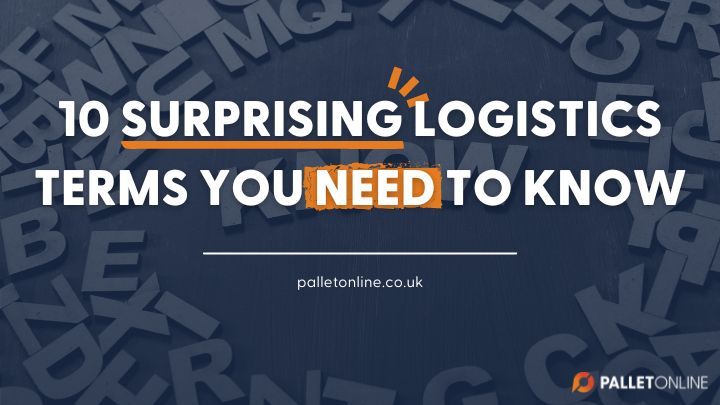10 Surprising Logistics Terms You NEED to Know!
How often are you baffled by the terminology pallet couriers use? Don't sweat it! We've all been there.

Although shipping terms may seem foreign to many of us, they're actually not as complex as they seem; trust us, we're logistics experts!
Here are ten logistics terms and their surprising definitions...
1. Consignor
The bill payer or consignor is a person or business responsible for organising a shipment.

For example, if you run an online business and you ship to your customers directly, the consignor (you) would be responsible for arranging to send the goods.
2. Consignee
A consignee is the recipient; this is the person at the end of the journey, at the delivery point.
When a courier mentions a consignee, what they mean is the person responsible for accepting the goods. But, this person doesn't necessarily have to be the person named on the booking.
3. Consignment
Despite claims that consignment and goods are synonymous, they have two slightly different meanings.
Goods are the items you are shipping, while a consignment is an arrangement between the sender and a third party to deliver those goods.
You may have heard pallet couriers say something along the lines of, ''Consignment number'', which simply means 'order number'.
A pallet courier may request your consignment number for tracking purposes.
4. Bill of Lading
The Bill of Lading (BOL) is a digital receipt that proves ownership of the goods and provides peace of mind for both the sender and recipient.
Plus, you can normally download and print the BOL for your records.

This document is available through tracking but can often be sent to you directly by the courier; it's their way of confirming that they no longer have possesion of the goods.
5. Customs Invoice
You'll need a customs invoice if you are shipping internationally. But don't worry, most couriers will prompt you to submit this whenever it's needed.
Your goods won't clear customs without this document, so be sure to do your research before confirming the details of your booking.
6. Incoterms
Again, if you're shipping internationally, you'll need to know all about incoterms and try not to let them confuse you, too.
Incoterms are a set of rules that define the responsibilities of sellers and buyers, so make sure you submit them correctly.
7. Proforma Invoice
A proforma invoice is different to a standard invoice; this is an estimated invoice used to request payment from the buyer for goods or services.
This type of invoice generally includes a goods description, the total payable amount and other transaction details.

8. Consequential Loss
In other words, the loss of goods or funds because a courier failed to carry out a service. For example, if a delivery is late and you have had to pay workers extra money to stay onsite, this would be classed as consequential loss.
Generally, most couriers do not compensate for consequential loss.
9. Consolidated Freight
A term you're likely to have heard and wondered what it meant; consolidated freight means multiple shipments put together in one trailer.

So, if a courier has 10 deliveries in one area, consolidating the freight means one driver can cover all drops, lowering consumer cost to benefit you!
10. Exception Scan
When a courier tells you, ''an exception has been raised'' on their end, they mean that collection or delivery has been held up slightly.
This can happen for many reasons, including if your pallet is held by customs or the driver was unable to collect or deliver your goods.